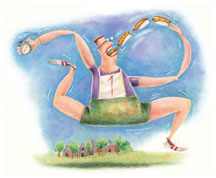
|
July 19, 2006: On the Campus
(Illustration: Marc Mongeau; Photo: Celene Chang '06) |
Star performances
By P.G. Sittenfeld '07
Several hundred students gathered in Little Courtyard on May 2 to cheer on 18 hopefuls competing for Princeton's hot dog eating crown. Participants representing residential colleges, eating clubs, and student organizations secured cash pledges for each hot dog downed. The event generated more than $6,500 for the American Leukemia Society.
Weiner winner Ruben Pope '07, representing Charter Club, demolished a stunning 16 hot dogs in 15 minutes. "I didn't raise that much money," Pope told The Daily Princetonian, "so I felt cheap and wanted to eat a lot."
Contestants took varying approaches to the competition. Some gobbled their dogs two at a time; others dipped the buns in water. Most of these speed-eaters met the same fate: a growling gut — or worse. Pope confessed to feeling a bit queasy after the contest, but he still fared better than many others. Almost half the field encountered their hot dogs again on the way back up.
Happily, there are more pleasant ways of achieving fame. So students learned this spring from David Duchovny '82, when the accomplished actor made his first public appearance on campus.
In a lecture at the James Stewart Theater, Duchovny said he never desired to be a television or movie star when he came to Princeton, and ridiculed a roommate who did. "I remember lying on our bunk beds in Blair Hall, listening to him talk about his acting ambitions, and thinking to myself, ‘What an idiot! You came here to act. Who would come to Princeton to act?'"
According to Duchovny, acting found him more than he found it. He became a household name through his role as FBI agent Fox Mulder on the hit series The X-Files. Yet for all of his success, Duchovny showed that even celebrities aren't exempt from embarrassment. English professor Maria DiBattista introduced Duchovny, her former student, by reading a section of his senior thesis on Samuel Beckett.
When he took the podium, Duchovny commented on the frequency with which he used the pronoun one in his thesis. "I might have been trying to distance myself from my work," he said. "Perhaps one was embarrassed by what one wrote."
Historians don't usually hang out with rock stars. Unless, of course, you're Sean Wilentz. A star performer in his own right, Wilentz stepped down at the end of this year after 12 years as director of the Program in American Studies. Students, faculty, and friends gathered for an end-of-semester party at Prospect House to sing his praises.
Because Wilentz received a Grammy nomination for his liner notes for Bob Dylan's 2004 CD, Live 1964, a Dylan impersonation contest initially was planned. However, vocally challenged party organizers ultimately thought better of spoiling Wilentz's favorite Dylan hits. Instead, professor Hendrik Hartog, Wilentz's successor as program director, and Judith Ferszt, veteran manager of the program, offered tributes to their colleague, while the student improv group Quipfire performed several skits.
Wilentz will continue to teach after taking leave in the coming year to do research for his next book. His latest book, The Rise of American Democracy, earned the prestigious Bancroft Prize and was a Pulitzer Prize finalist, and Wilentz penned a Rolling Stone cover story in May in which he asked whether the Bush presidency is the worst in history.
"I'd like to thank Henry Louis Gates [a member of the Pulitzer Prize Board] and the Pulitzer Prize committee," Wilentz quipped in his remarks at the party in his honor. "Oh, wait, I guess I don't get to give that speech."
Members of the men's cross country team are scantily clad when they go for long-distance runs: short shorts, sleeveless jerseys, sneakers, and little else. Before a routine run this spring, three team members decided to liven up practice by shedding items until they were sporting nothing but shoes and socks. Ten teammates tried to strategically shield the Full Monty-ed trio for the nine-mile run, as observers responded with hoots and hollers.
Streaking usually suggests a short-distance sprint. "I think we created an entirely different genre," said one of the three, who asked to remain anonymous.
In Princeton's other once-prominent streaking event, the now-banned Nude Olympics, students ran around Holder Courtyard the night of the year's first snowfall. "This has to be the longest naked dash in the history of the school," said the same nude runner. "What we did would be like 300 laps around Holder Courtyard." π
P.G. Sittenfeld '07 is an English major from Cincinnati.
MOREONTHECAMPUS at princeton.edu/paw: "Rites of passage" by Amy Sennett '06
![]()

To read our exclusively online On the Campus column, click here.
